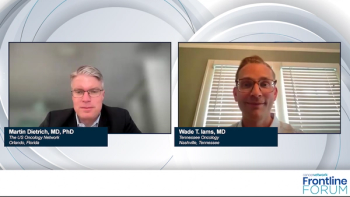
Medical oncologists discuss the overall research landscape in advanced EGFR-mutant NSCLC, highlighting exciting trials and emerging data in the evolving treatment space.

Your AI-Trained Oncology Knowledge Connection!


Medical oncologists discuss the overall research landscape in advanced EGFR-mutant NSCLC, highlighting exciting trials and emerging data in the evolving treatment space.

Martin Dietrich, MD, PhD, shares expert perspectives on recent data from TROPION-Lung05 and HERTHENA-Lung01 in advanced EGFR-mutant NSCLC.

Wade T. Iams, MD, provides clinical insights on proactive management strategies for patients receiving amivantamab for advanced EGFR-mutant NSCLC.

Focusing on treatment practices for patients with advanced EGFR-mutant NSCLC, Martin Dietrich, MD, PhD, discusses how the availability of subcutaneous amivantamab can potentially address current treatment barriers.

Wade T. Iams, MD, outlines insights gleaned from recently presented data from the PALOMA-3 trial in advanced EGFR-mutant non–small cell lung cancer.

Martin Dietrich, MD, PhD, discusses the secondary analysis from MARIPOSA evaluating first-line amivantamab plus lazertinib in patients with advanced EGFR-mutant NSCLC.

Following the 2024 ASCO Annual Meeting, medical oncologists share insights on how the availability of the FLAURA2 treatment regimen has impacted the treatment of patients with advanced EGFR-mutant non–small cell lung cancer (NSCLC).

Closing insights into managing EGFR-mutant NSCLC, from evolving treatment options and sequencing strategies to addressing unmet needs and the importance of comprehensive genomic testing.

Unmet needs in EGFR exon 20 insertion lung cancer, emphasizing the importance of early identification, selectivity against wild type EGFR, CNS activity, and mechanisms of resistance.

Experts discuss the rapidly evolving treatment landscape for EGFR exon 20 insertion lung cancer, highlighting recent advancements in therapies, clinical trial results, and the quest for first-line treatment options, providing valuable insights into managing this unique patient population.

Learn about the latest developments in the treatment of lung cancer, focusing on EGFR mutations, antibody-drug conjugates (ADCs), targeted therapies, and biomarker-driven approaches to improve patient outcomes in various stages of the disease.

Shared insight into the complexities in treating EGFR mutant lung cancer during the second-line therapy phase, including safety profiles of different treatment regimens, managing toxicities, and ongoing research to improve patient outcomes.

Experts consider the influence of combination therapies on EGFR-mutant lung cancer treatment, including the impact on central nervous system (CNS) response, challenges in CNS metastases management, and the potential alternatives to whole-brain radiation.

Explore significant updates in the field of EGFR-mutant lung cancer treatment, focusing on the introduction of combination therapy in the first-line setting, including the FLAURA2., MARIPOSA, and RAMOSE trials, offering improved progression-free survival and potential implications for patient care.

Insights into diagnosing EGFR-mutant lung cancer and explores evolving first-line treatment strategies, incorporating recent developments, combinations, and clinical trial data, while addressing challenges in testing and patient management.

In the final part of the small cell lung cancer podcast series, CancerNetwork® and Wade Iams, MD, discuss the future of treating patients with this disease.

In episode 3 of a 4-part small cell lung cancer podcast series, Wade Iams, MD, highlights practical considerations for treating patients with small cell lung cancer, including managing toxicities and the impact of treatment on a patient’s quality of life.

Wade Iams, MD, broke down some of the different treatment options, including lurbinectedin and topotecan, for patients with relapsed/refractory small cell lung cancer in the second episode of a 4-part small cell lung cancer podcast series.

In the first episode of a 4-part series, CancerNetwork® spoke with Wade Iams, MD, about the various first-line treat options that are available for patients with small cell lung cancer.